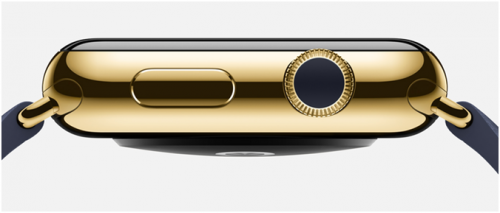The Apple Watch is here. While waiting for first reactions, Apple is trying to be positioned as a luxury product. Decryption by Philippe Jourdan, Promise Consulting’s CEO, University Professor at Paris-Est, and Jean-Claude Pacitto, Senior Lecturer at Paris-Est.
TO READ IT IN FRENCH / POUR LE LIRE EN FRANCAIS :http://bit.ly/1e4ZrjS

The recruitment of new personalities from the fashion and luxury universe who are in charge of important responsibilities at Apple underlines the brand’s strategic “repositioning”, and is confirmed by the firm’s first launching actions, emphasizing the product’s luxurious aspect. Still, is that enough to make Apple become a luxury brand? Isn’t it too early?
Obviously, the product generates interest: uncluttered esthetics, luxurious versions from 11.000 euros in golden yellow or pink variations, decorated with precious stones, a customization of bracelets and cases and two sizes of screen, so many signs of the luxurious character of the object. Communication is not outdone: an exclusive presence in the Colette store in Paris, an ambitious media plan in the Vogue magazine and an appearance on the wrist of the model Liu Wen, all of which should boost the desirability of the connected watch. Still, there’s a world between the luxury object and the technological object. Which one does the Apple Watch really belong - and subsequently the brand Apple - to?
Let’s begin by defining what a luxury brand is. A luxury brand presents very precise characteristics: price, image strength, selectivity of the distribution, prestige of the clientele, historic implanting in a culture, conservation of a savoir-faire or a traditional job, localisation of manufacturing and finally, creativity. Some of these criteria are possessed or achievable by the brand Apple, for others it seems more complicated.
We should not discuss either price, or image strength: in the case of the Apple Watch, these two criteria seem fulfilled. By favoring a selective distribution in its own shops (famous Apple stores), the brand knew exactly how to "sublimate its identity", strengthened by a thorough research on the customer relations planned for Watch. The purpose is to lavish the best advice, like a jeweler. This is a well-thought strategy to differentiate from an already well-established competition (Pebble, Samsung, Sony, Withing, LG, Kronos, etc.). But it is especially an essential precaution, because shifting from a technophile clientele to a luxury clientele is not without risk for the brand. A loss of landmarks and authenticity with its base clientele could bring part of them to turn away from Apple, feeling in a way rejected. Yet the strategy of Apple always was to make the customer be, not only a simple buyer, but a member of the brand’s circle. Furthermore, having tested the "low-cost" strategy with the iPhone 5C, Apple takes, with its repositioning, the risk of "widening" its clientele too much and subsequently diluting its leading identity, following the example of luxury brands as Louis Vuitton. “He who embraces too much, holds little” as it was said in the XIVth century! Finally, the border between an object of fashion and a luxury object also goes through the temporal and geographical horizon which they draw from: the luxury object is timeless, a characteristic difficult to claim in the universe of the digital technology. It joins a traditional, otherwise ancestral savoir-faire. There is a strong identification to a specific country which gives the Watch all its meaning: the beautiful mechanics is German, the watch-making is Swiss, the fashion design is Parisian, the design is Italian, but what about connected objects? By wanting to be a "global" company in an essentially "technological" universe, Apple deprives itself from the status of luxury brand. It should not however prevent the brand from being successful.